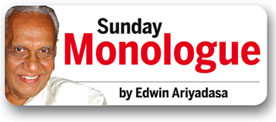"English - and why not?"
 When you stay too close to an enormous tapestry, its detail
overwhelms you. You are quite likely to miss the total pattern - the
whole picture. The parallel is emphatically, true of President Mahinda
Rajapaksa's inspired Language Policy. When you stay too close to an enormous tapestry, its detail
overwhelms you. You are quite likely to miss the total pattern - the
whole picture. The parallel is emphatically, true of President Mahinda
Rajapaksa's inspired Language Policy.
He spoke at august international assemblies, at times, in Sinhala.
Occasionally his address would be in Tamil. At the height of the victory
over the dark and evil forces of diabolical terrorism, he made it a
special point to deliver his verbal presentations in Tamil as well. At
first, when we stood close to these public language usages by Sri
Lanka's President, on prestigious occasions, many would have missed the
inner significance of his intent.
Then came the announcement of the National English Language Policy,
launched for the purpose of enhancing the quality of learning and
teaching in this country. With this, the President's far-sighted and
magnanimous language policy emerged in full articulation. If the
President was keen to ride the crest of the wave of vast enthusiasm,
that swept the length and the breadth of the nation, in the slip -
stream of the defeat of LTTE, he could have garnered personal glory, by
fanning mass euphoria.
But, he shunned such a narrow course of action and looked far ahead.
Closerlinks between Sinhala and Tamil, were essential for total national
integration, that would ensure sustained peace and harmony. He was
convinced that refined and sophisticated English was the key for our
people, especially for the younger generation, to realise the full
potential of their genius, enabling them to qualify for higher
professional opportunities available, world-wide. Besides, he was fully
aware that, source - material available in English, will deeply enrich
Sinhala and Tamil literature - both fiction and non-fiction.
In the current, Sri Lankan scenario, there is still a wee bit of
diffidence about English. I am sure, the Editors of "Montage" will,
indulge me, if I took a modicum of space to air some of my pet views
about the prevailing fear of English.
There are those who dare challenge the English language, however
formidable and frightening an entity, it may appear to others. For
centuries, the English language was the prim and proper symbol of the
British imperial establishment. The early American colonists across the
Atlantic assaulted the English language as part of their sustained
struggle to assert their independence from British rule.
In their urge to be different from their erstwhile imperial rulers,
the Americans deployed the English language very much unfrightened by
its syntactical imperatives and vocabulary orthodoxies.
 The outcome of this daring American challenge to the English language
was wittily summed up by the great Bernard Shaw, who said. "The US and
Britain are two nations divided by the same language". The American
users reduced much of the solemnity of the English language to a "slippered
ease and made it emerge in shirt sleeves". The outcome of this daring American challenge to the English language
was wittily summed up by the great Bernard Shaw, who said. "The US and
Britain are two nations divided by the same language". The American
users reduced much of the solemnity of the English language to a "slippered
ease and made it emerge in shirt sleeves".
In the early days, the high deference shown to the English language
bordered upon a religious fervour. Taking liberties with the accepted
standards of English language-use was almost an unpardonable sin.
Articulation
The BBC became the predominant setter of English standards. If you
were in doubt about the proper articulation of words and idioms, turn to
the BBC usages. That was the prevailing dictum. Britain was the
unquestioned citadel and sanctorum sanctum of the English language which
was elevated to the status of King's (Queen's)English. You had to be
afraid of the English language, lest you sullied its purity of
expression. About three decades ago, the Sri Lankan diffidence in the
presence of the English language resulted in the characterization of
English as the "Kaduwa" (the sword).
But suddenly, the world over, English language is being widely
challenged. In the post-colonial cultural flux, transnational forms of
English use began to proliferate. The culturally mobile tribe of
creative writers needed an idiom of expression to articulate their
frontierless style of experiencing. The traditional conservative use of
the English language proved inadequate to externalise their inner
yearnings. These highly creative men and women uprooted from their
original cultural moorings, took massive liberties with the English
language.
The universality of English provided them the proper vehicle to say
their say to a global audience. But, they were not at all afraid of the
English language. They brought an astonishing thematic variety to their
writings in English, leavened with idioms, hitherto alien to orthodox
English. Strangely enough, one of the pioneering writers who-unabashed
and unfrightened-contributed a totally new thematic variation, was our
own. J. Vijaytunga. His 'Grass for My Feet'. charmed the English
language with its lyrical celebrations of simple and unaffected life in
a Sri Lankan village. His unconventional English idiom reflected the
rustic purity of his rural characters who inhabited a landscape that was
exotic for those who were bred on traditional English literature.
It was an English Governor of Sri Lanka Sir Andrew Caldcott, I
believe - who extolled the virtues of J. Vijatunga's work to his own
countrymen.
Lifestyle
J. Vijaytunga chronicling the life of his ritual dominated Sinhala
village, asked in effect, "who is afraid of the English Language?" Long
before, post-colonial writers such as Ben Okri of Nigeria recorded the
lifestyle of their superstition-prone villages, J. Vijaytunga broke
loose of the thematic shackles of the traditional English literature.
What he communicated was a non-English "feel" exploiting the English
usages to convey rural perceptions.
Decades later, when the Centre of the British empire came to be
overwhelmed by the peripheral literary visions of those who inhabited
the former colonies, once again a Sri Lankan produced a work that
confronted undaunted, the citadel of established English literary
concepts.
This is Michael Ondaatjie, who in his Booker Award winning work of
fiction, 'The English Patient' crafted a verbal icon to monument the
soul-searing philosophy of the frontierless culture-refugees of our
time, wrenched away, by choice mostly, from their native, traditional
moorings. His anguished words, gushing out from the bottom of his heart,
form the collective cry of those whose souls are assassinated by the
keepers of nation-cages that crib and confine the human essence. Says
he; "Gradually we became nationless. I came to hate nations. We are
deformed by nation-states. Erase the family name! Erase nations". Such
voices represent those in the upper reaches of creative writing in
English, who when confronted by the restricting limitations that thwart
them, would in effect pose the rhetorical question, who is afraid of the
English language?
Those exceptionally gifted men and women of letters are in fact
gleeful that the English language is there, for them to bend and twist
at will, to bring out the meanings they need to express at global level.
Suppleness
These are the elite who defy and challenge the English language and
proceed to create their own idioms of thought and articulation,
imparting a suppleness and even a lyricism at times, to the unyieldingly
conservative English language. Ironically enough, they, for the most
part, are either contenders for or are the winners of the British Booker
Prize, Arundathi Roy, welded together strands of her indigenous culture
to enrich the English language, she made her vehicle.
But, in Sri Lanka and in a host of other countries, there is a
burgeoning group of cultural refugees of yet another ilk.
They are unafraid of the English language because they are fuelled by
a sheer ignorance of that language. When they say, "Who is afraid of the
English language?", it is an assertion of their right to ride roughshod
over English, speaking an idiom which they mistake to be good English.
Many in the culturally mobile younger generation in Sri Lanka, have
scant respect for the English language and for that mater even for their
own Sinhala language.
They SMS to their heart's content spawning expressions like In U 2
can C UR friends. This is the English language for them. When they speak
it, the outcome is a crumpled heap of words, intended to pass for
English.
We witness today yet another fast growing stream of English. Due to
the lack of any other adequate definition, their brand of English could
be characterized as Migrant English. Luckily for most of our migrant
workers,their host countries have very little to do with English.
Self-confidence
In such a context, the handful of English words at their command
gives them a lavish self-confidence, which fills their egos with the
illusory notion that what they speak in English.
What appals me is the audacity with which this kind of English
language challenger, flaunts his 'command' over English.
Save us also from the public atrocities performed by those, who put
up some obnoxious signboards.
There are those that blatantly declare Body Parts. Unsuspecting
visitors to our shores will get revolted by the wares we have for public
sale.
English names given to some of our popular food items, are quite
likely to call our culinary culture seriously to question. There are for
instance, 'ladies' 'fingers' (Bandakka - Okra) and 'drum-stick' (murunga).
But ' 'snake-gourd' (Pathola) takes the cake.
The verbal atrocities, that result from a yoking together of Sinhala
and English are yet another intriguing development, in the field of
English usage in Sri Lanka.
Motley mix
This is a deliberate attempt to pander to those who need to feel that
they are English oriented. This motley mix of English and Sinhala haunts
many an electronic media channel, stirring a harrowing pessimism within
you about the survival of English at the level of this nonchalant
generation. This evokes misgivings even about the Sinhala language. A
study effected by the University of Manchester, gloomily forecasts that
50% of the world's 6000 languages may be extinct by 2050. The irreverent
use of languages in our own country raises foreboding in our own mind.
Who is afraid of the English language? could be asked in yet another
contest today. A recent survey revealed that "In many Asian countries,
in Europe and the USA, Mandarin has emerged as the new 'must have'
language.
Did Mandarin say "Who is afraid of the English language?
With all that, about English in Sri Lanka, one has to adopt the
attitude of lexicographer Dr. Samuel Johnson.
When shown a dog walking on its hind legs, the learned doctor was
nudged to utter an immortal witticism. He said, "one is surprised not
that it is done well, but that it is done at all". Adapting it to our
context, in this present atmosphere of wide-spread English disuse, one
could say, "We are surprised not that English flourishes in Sri Lanka
but that it survives at all. But, in spite all those hesitations,
English in Sri Lanka has entered into a vibrant new era.
The State has decreed that, the teaching and learning of English
should be a primary urge in our language policy.
|

